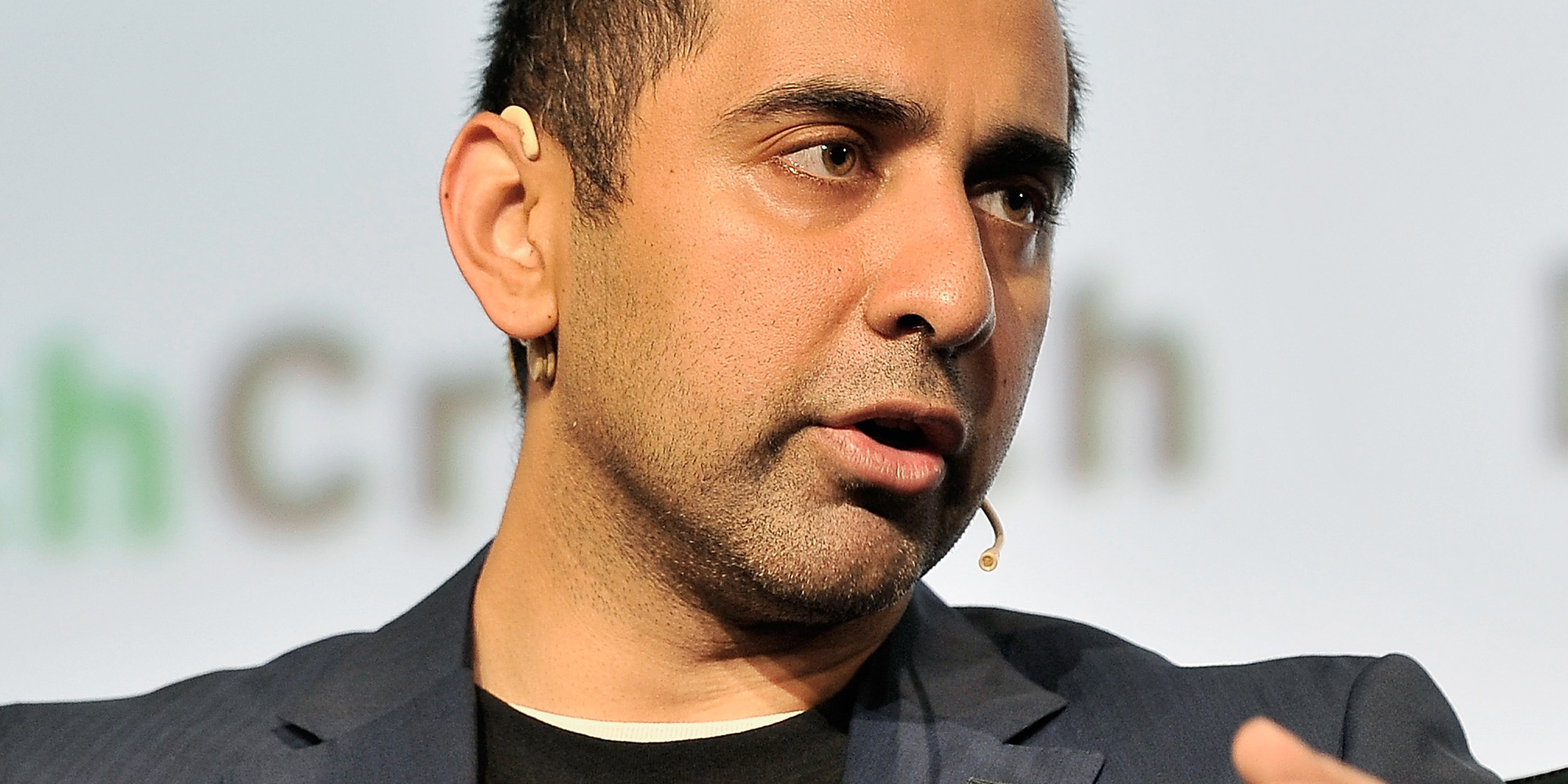GUEST ESSAY
Goodbye, the beloved country — hello, the network state

Imagine 20 million people of like mind on some core issues of citizenry and culture assembled as a collective. Imagine the bargaining power of such a group. If you ignore geography, what you have is a virtual country.
Balaji Srinivasan is an entrepreneur, scholar and one of crypto’s big thinkers who has been vocal on numerous matters around technology and society for a long time — when he talks, everyone listens.
On 22 July, he published the eagerly anticipated book “The Network State”. Its influence has rippled out well beyond technology and into philosophy, politics and economics.

Balaji Srinivasan. (Photo: Steve Jennings / Getty Images for TechCrunch)
The book’s proposition is simple, startling and, for most, a little over the top:
Software has allowed us to build our own companies like Airbnb, our own communities like Facebook, our own currencies like Bitcoin. Now it is going to let us build our own countries.
Reading the above sparks a shower of objections. You mean as an equal to the US? France? South Korea? Competing and collaborating and engendering culture and loyalty and security and wealth creation and citizen fulfilment?
Yes, that is his central thesis.
And so he starts to build his case. In network states, he argues, the geography is primary and the ideology is secondary. I had always understood this differently, having believed that the nation-state was the caretaker of a cultural and political ideology.
But as he convincingly points out, Russia swapped communism for nationalism without so much as a by-your-leave, while the geography stayed constant. Plenty of other examples come via war, revolution and the ballot box.
Consider that it is fairly common to find “shared belief” groupings of many tens of millions or more online via social media, often catalysed or founded by a small group of people, or even one person.
Imagine, now, that 20 million people of like mind on some core issues of citizenry and culture assembled as a collective. Imagine the bargaining power of such a group, especially if the group has economic power, plus its own cryptocurrency.
If you ignore geography, what you have is a virtual country. So why not negotiate for recognition as such? Passports and travel and the like? Objections well up again — the United Nations, armies that exist as a mechanism of violence against threats, taxes, etc.
Balaji defines the network state like this:
“A network state is a social network with a moral innovation, a sense of national consciousness, a recognised founder, a capacity for collective action, an in-person level of civility, an integrated cryptocurrency, a consensual government limited by a social smart contract…”
There are, of course, a series of layered arguments that brings him to a place in which he not only believes in the practicability of such a proposition, but, more pointedly, to its inevitability.
For instance, Balaji references The Sovereign Individual, the 1997 book by James Dale Davidson and William Rees-Mogg, describing a citizen who wants to live with minimal surveillance and maximal personal freedom.
It is not a huge jump of logic to now imagine a unified grouping of such individuals coalescing around a shared worldview. A Sovereign Collective, he calls it. And if one can imagine a Sovereign Collective, then the logical leap to “country” status is simply a matter of numbers and bargaining power.
The two examples offered to prove his point about non-geographic collectives of shared worldviews are the pre-Israel Jewish diaspora and the supporters of Islamic State, both externally cohesive cultural groupings without the benefit of borders.
Balaji dredges up Leviathan (a many-headed monster originating from the Old Testament in the Book of Isaiah, but put into service of Greek mythology, a huge scary sea monster whose bidding you would be well advised to follow). He presents us with three Leviathans driving prosocial behaviour throughout the arc of history.
The first was a transcendent God. People behaved in a pro-social manner mainly out of a fear of displeasing God and getting whumped upside the head in the afterlife. Or even before the afterlife.
As religion and superstition started to lose their grip, the nation-state stepped in as the next Leviathan (think of the English Papists being forced out by the King of England). You also do not want to mess with these people. They will put you in prison and worse for antisocial behaviour. We do not steal, partially for that reason, mixed in, I suppose, with some good old religious morality.
But his new Leviathan is a far more gentle creature. It is advanced technology. It is maths. It is cryptographically protected property rights. You don’t steal because you can’t. The maths won’t allow it. You don’t need God or the nation-state to threaten you.
Read more news and analysis on the latest in the world of cryptocurrency
You need a great deal of philosophical rope to let this pass without contestation, obviously. But I like the argument. It is indeed true that cryptographically secured property rights act as a bulwark against theft and seizure — crypto gives certain provenance.
It is obviously a broad debate, with no small amount of snarky derision and breathless admiration pouring from all corners, particularly after the book and subsequent blogs and YouTube and podcast appearances.
Balaji was basically batting away the entire history of human societal evolution and saying: I have a better idea because of some fine new maths.
And today’s nation-states are all powerful, especially the ones with both democracies and bombs. One needs to try hard to imagine an alternative that would not be met with concerted resistance and smothered at birth. On the other hand, the very first stirrings are being seen — and heard.
There is CityDAO, for instance, in which 40 physical acres were purchased in rural Wyoming (of course) and people were invited to apply for passports which were issued via NFTs (actually, Soulbound Tokens, previously discussed). That gives city citizens a right to vote on how land is to be used and governed, as well as given the right to purchase land at some future date when more can be acquired.
Not a whole lot of pizzazz here, given that the land is in a real country, and so has superseding laws. Also, CityDAO has not met its projections. They have 5,000 members, about half of their forecasts. Still, an interesting early experiment.
Then there is PraxisSociety, which was seed-funded by Balaji and had a second round of funding in March. Their vision statement, as you enter the website, is aspirational:
“Praxis is a society of future city residents, ranging from founders, creatives, investors, and all in-between. Our membership is application-based. Once accepted, members attend events and can participate in the building of the city. Most importantly, members have a shared way of life: optimism, good health, clear purpose, and commitment to an idea greater than themselves, encapsulated in a word: Vitality.”
As much as I want to buy into this vision, it has a quasi-religious feel to it, which makes me nervous. Reading the preceding paragraph with a jaundiced eye, one immediately sees a shimmer of cults, or something near that. What starts as a “common moral worldview” can easily unravel into a fundamentalist nightmare.
Still, there are some very important thinkers and financiers taking this seriously and the promise is indeed fascinating. It takes us well beyond cryptocurrency prices and NFTs and Metaverses and into the blockchain as a driver for a gentler democracy.
It is an easy matter to laugh. But it is a tantalising thought. DM
Steven Boykey Sidley is a Professor of Practice at The University of Johannesburg.




















 Become an Insider
Become an Insider
Thanks for the interesting article!!
You are absolutely correct that the nation-states are not going to give up their power very easily. In fact they are going to use the same fine maths & CBDC’s (Central Bank Digital Currencies) to further increase their power and control to limit the freedom that Balaji dreams of.